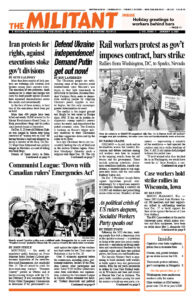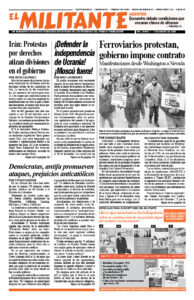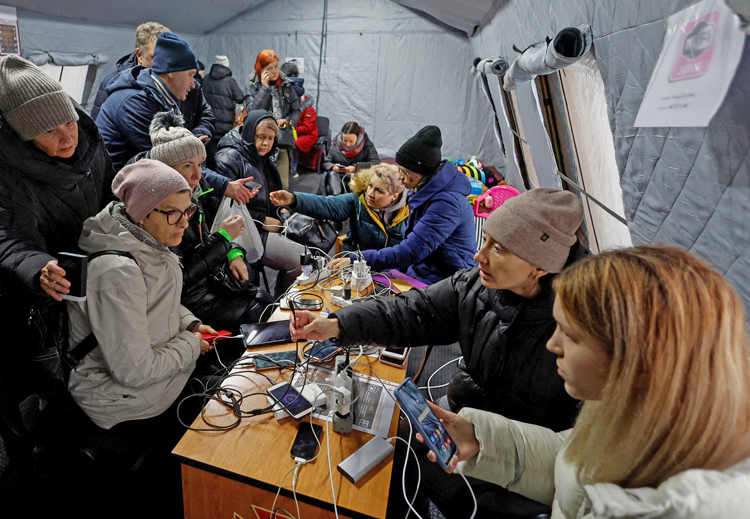The Ukrainian people are withstanding some of the heaviest aerial bombardment since Moscow’s war began as they fight tenaciously to drive back its invasion. Russian President Vladimir Putin seeks to demoralize working people by crippling Ukraine’s power supplies as winter begins, but this only encourages greater determination to resist.
The conflict is the largest ground war fought by two states in Europe since 1945. It has set in motion realignments among capitalist powers across the world, and exacerbated the global economic crisis. The Kremlin is banking on Russia’s bigger military resources to wear Ukrainians and their supporters down and tip the scales in its favor.
In a sign Ukrainian forces are successfully holding the city of Bakhmut in the eastern Donbas region, President Volodymyr Zelensky made a surprise visit there Dec. 20. The city is in ruins from months of Russian bombardment, with few civilians remaining. Waves of assault by Wagner mercenaries deployed by Moscow, as well as the Kremlin’s own armed forces, have resulted in heavy losses on both sides.
Scores of Russian missiles and drones targeted electrical infrastructure in eastern and southern Ukraine repeatedly in mid-December, plunging millions into darkness without heat or water. Rescue and utility workers raced to repair the damage. Local authorities are building neighborhood “invincibility centers” for people to gather to warm up, share news and recharge electronic devices.
Moscow’s bombardment comes after the Ukrainian army, swelled by working-class volunteers, drove Russian government forces from the outskirts of Kyiv, then from around Kharkiv and more recently from occupied Kherson.
Putin flew to Belarus for the first time since the war began for talks with President Alexander Lukashenko Dec. 19 to pressure him to do more to back Moscow. Lukashenko has allowed Belarus to be used as a staging ground for the invasion. But he is wary of the depth of opposition he faces at home, which exploded two years ago when hundreds of thousands of working people fought to oust Lukashenko, who clung onto power with Moscow’s support. He has kept Belarusian forces away from direct involvement in Moscow’s war.
Calls continue to rise from bourgeois politicians from Washington to Paris to press the Ukrainian rulers to support “peace” talks, ceding territory to the regime in Moscow. Former Secretary of State Henry Kissinger said Dec. 17 that Washington needs Moscow’s help to maintain the imperialist world order. He called for a negotiated return to the “prewar dividing line,” approving the Russian rulers’ 2014 seizure of Crimea and parts of eastern Donbas, where Moscow-led separatists grabbed control from Ukrainian authorities the same year.
Imperialist powers rearm
“Russia’s invasion of Ukraine” has “shaken the foundations of the international order,” the Japanese government said in a Dec. 16 announcement of its biggest military buildup since the second imperialist world war. It plans to double military spending by acquiring long-range missiles, more naval vessels and fighter aircraft, saying this is necessary to counter the “greatest strategic challenge posed by China.”
The military budget of the Chinese government is now four times that of Japan’s imperialist rulers. Fumio Kishida, prime minister of Japan, has warned in speeches about the possibility of Beijing attempting to capture Taiwan. Japanese capitalists see their interests threatened as the Chinese rulers warn they will use force to bring self-governing Taiwan under their control, along with vital sea lanes in the region.
Japan hosts 54,000 U.S. troops, the largest permanent contingent of U.S. armed forces anywhere overseas. The government there is scrapping constitutional restrictions on the use of its armed forces that were imposed by the U.S. rulers after their victory in World War II when Washington sought to assert its domination across the Pacific.
The German rulers are hastily reducing their decadeslong dependency on Russian energy. Putin had hoped to use this as leverage to reduce opposition in Germany and elsewhere in Europe to his invasion.
German Chancellor Olaf Scholz opened the first of several floating terminals Dec. 17, linked to the country’s gas pipelines. Imported liquid natural gas will be substituted for supplies of Russian gas cut by Moscow or blocked by U.S.-led sanctions. Three months ago, Berlin took control of three oil refineries owned by Russian oil giant Rosneft.
Putin’s war is aimed at crushing Ukrainian independence and reestablishing the Great Russian Empire. The czarist rulers imposed Moscow’s domination over vast areas and peoples in Eastern Europe and across Central Asia.
The conquest of power by workers and farmers during the 1917 Russian Revolution opened the door to freeing millions from the czarist prison house of nations. Led by V.I. Lenin and the Bolsheviks, the new workers and farmers government advanced the right of oppressed nationalities to self-determination, including for Ukraine. This made possible the flowering of their cultures, the founding of the Soviet Union as a voluntary federation and waging a fight to eradicate all expressions of Great Russian chauvinism.
But these conquests were overturned in a political counterrevolution under Joseph Stalin in the 1930s. Ukraine reestablished its independence only after the collapse of the Stalinist regime in 1991.
As Putin tries to reconquer Ukraine, his war is rousing working-class struggle at home.
Women were a majority of the thousands of protesters detained in national actions opposing Putin’s Sept. 21 military callup. They spearheaded protests in Daghestan, Tyva, Bashkortostan, and other regions over the deployment of draftees. In mid-November, women demonstrated outside offices of the Russian military, from St. Petersburg to Ulyanovsk over the treatment of conscripted relatives.
Olga Tsukanova, who joined the actions, is the mother of a 20-year-old draftee from the Astrakhan region. She is a co-founder of the Council of Soldiers’ Mothers and Wives.
“We demand that councils of mothers and wives in every city be allowed to inspect military units where mobilization is being implemented to find out if they are being trained properly and if medical commissions have been established,” Tsukanova told the press. “We are also demanding the beginning of peace talks.”
The group sends Putin and the army hundreds of messages of complaint that are mostly ignored.
Tsukanova and two other council members were arrested Dec. 8 on “suspicion of drug smuggling” before one of them was investigated for distributing “extremist” material. All were released a few hours later.
“This system is afraid of popular unity,” Tsukanova wrote. “They are afraid of us and they are targeting women who are trying to protect their boys.”


